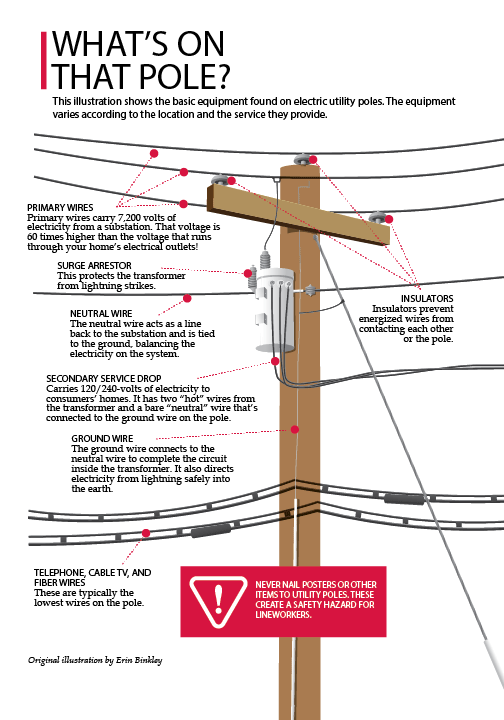Always Look Up
While NEC installs some power lines underground, the majority of the Cooperative's power lines are overhead, running through neighborhoods and yards to your home. Familiarize yourself with the location of power lines in the area you will be working.
If you are planning to take down or prune a tree near overhead power lines, contact NEC to request a review of the situation to ensure that it is safe for you to complete the work. If the tree is too close to overhead lines, professional line clearance tree trimmers should perform the work.
Keep ladders and other tools clear of power lines when completing projects such as gutter cleaning.
- If an overhead line falls on your car, know that you are safe as long as you stay inside the car. If you must exit the car, jump, being careful not to touch the car and ground at the same time.
- A tree trimmer, metal ladder or other object can extend your reach dangerously close to power lines. Never trim or remove trees near overhead lines. Avoid planting new trees where they might grow into an overhead line.
- Teach your children never to climb trees near overhead lines and to be aware of the danger posed by those power lines.
- Never let children play or climb on the big "green box" in your yard. Known as pad-mount transformers, they are extremely dangerous and should always be locked.
- Always fly kites and model airplanes away from overhead lines. If a kite or model airplane gets caught in an overhead line, never attempt to retrieve it. Call REC to remove it.
- If you see a broken or fallen overhead power line, assume it's "live" and call REC immediately.
- Know that utility poles and fences around electric substations and transformers on the ground are "off limits" to everyone.
Putting signs or other items on utility poles creates serious safety hazards. Staples, nails, and tacks used to hang signs - as well as the signs themselves - pose dangers to NEC's linemen who climb poles when restoring power following storms or while performing routine maintenance to ensure system reliability. Nails and tacks left behind from signs can snag utility workers' boots or puncture safety clothing, making linemen vulnerable to slipping or even electrocution.
Never attempt to shoot through wires or at anything that may be on the wires or poles.
Gunshot damage to electric equipment can cause an electrical arc or cause wires to fall, with a high risk of serious injury or death.
Never shoot towards power lines, fiber optic cables (affecting communications with critical infrastructure and disrupting member internet services), or electrical equipment. Repairs can be VERY costly particularly when it comes to replacing fiber optic cable. Whether you’re a homeowner, a contractor, or a visitor on someone’s property, if NEC’s lines or equipment are damaged by accidents, acts of carelessness, or improper notification to SC811, the responsible party will be held liable for the repair costs associated with their actions.

